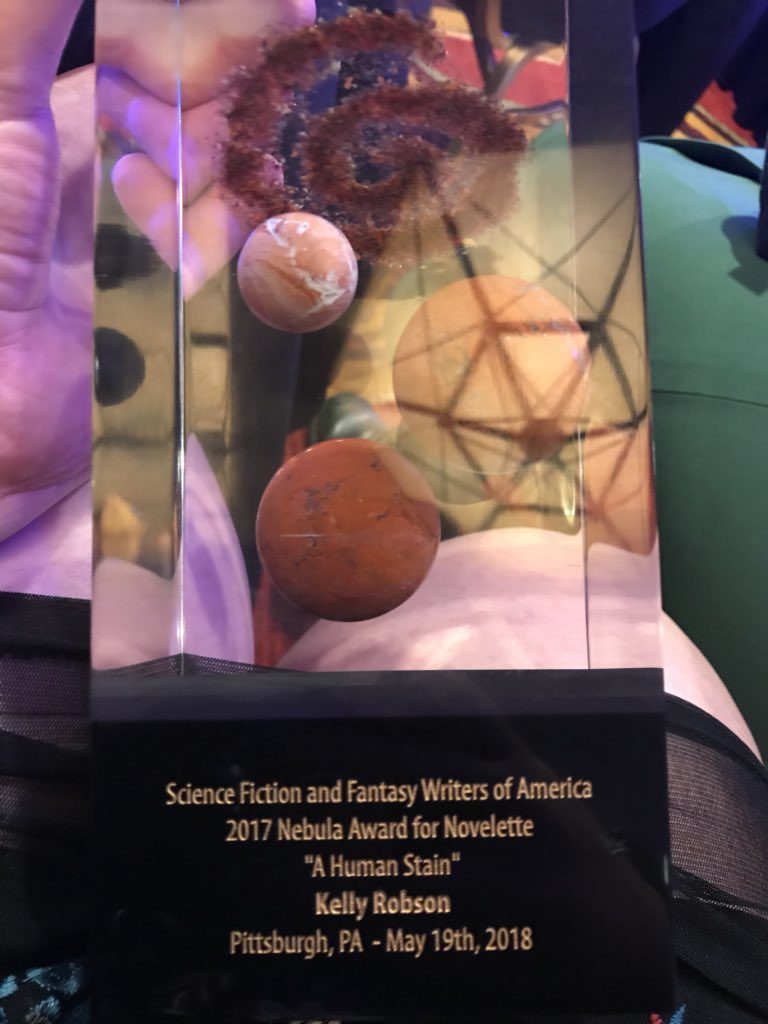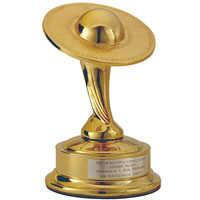








[Introduction: Gary Westfahl has authored, edited, or co-edited over thirty books about science fiction and fantasy, including the Hugo Award-nominated Science Fiction Quotations (2005) and the two-volume Science Fiction Literature through History: An Encyclopedia (2021). In 2003 he won the Science Fiction Research Association’s Pilgrim Award for his lifetime contributions to science fiction and fantasy scholarship.]
By Gary Westfahl: I am announcing a new science fiction award, the Westfahl Award. Unlike other awards, given to science fiction authors and works, this award will be given to other science fiction awards. Specifically, it will “honor” the most dubious and superfluous awards in this field.
Given the extreme proliferation of such awards, there will be no shortage of credible nominees.
The award’s other special feature is that, unlike other science fiction awards, it is not designed to encourage people to continue the fine work they have been doing; rather, in the tradition of Hollywood’s Razzie Awards, the hope is that the stigma of such an award might encourage some recipients to stop what they have doing – giving out questionable awards – and significantly reduce the number of such awards, to everyone’s benefit.
*****
In a sense, all these awards are superfluous, since authors effectively receive awards all the time, as a natural consequence of their careers. This is especially true of science fiction writers, since the strong community that grew up with the genre supports several mechanisms to honor the field’s popular writers. To list some of these natural awards: writers read letters in magazines and receive personal letters from fans praising their work; their stories are chosen to be republished in anthologies; they attend science fiction conventions to be greeted as honored guests and are asked to sign copies of their books; they are interviewed by major publications interested in their works; they are consulted by journalists seeking quotable comments on contemporary phenomena related to science fiction; their texts are analyzed by science fiction commentators and scholars; and publishers request that they provide blurbs praising other authors’ works, testifying to their own prominence as names readers will recognize and respect. Most significantly, they regularly receive checks for published stories and royalties from their books, and I would argue that these represent the most tangible and meaningful of all awards. In all these ways, then, authors are regularly informed that their writings are meritorious and appreciated, and they don’t need small statues or fancy certificates to confirm that is the case.
The question then becomes: if they aren’t really necessary, why are there so many awards, and why have these awards become so numerous that it now seems File 770 is announcing some new award every day? The answer is not that authors and their works require recognition, since as noted that is already occurring. In a few cases, such as the Arthur C. Clarke Award and the Endeavor Award, awards do provide funds that contribute to the authors’ income, so one can defend them as charities to support worthwhile writers; but almost all of the other awards for science fiction writers offer nothing more than some objects to place on their mantles or certificates to hang on their walls.
The real purpose of these awards, in virtually all cases, is nothing more than self-aggrandizement, an effort by organizations to draw more attention to themselves. Consider this situation: you have a science fiction society dedicated to a particular region, or particular subgenre; you publish fanzines, you stage annual conventions, you sponsor other activities, but you are distressed to realize that you are being entirely ignored by the larger science fiction community. So you have a brilliant idea: we’ll establish and give out annual awards! Some distinguished authors might show up to accept them at our conventions, increasing our attendance, and we can send announcements of our awards to science fiction websites, publicizing ourselves as well as our recently invented awards. And every time one organization implements this policy, it can inspire other organizations to do the same, each coming up with some category of science fiction to honor that is not precisely covered by all the other awards.
Whenever people read an announcement about yet another science fiction award, then, they must bear in mind one simple fact: the award is not primarily designed to honor the identified author or work; it is primarily designed to honor the organization bestowing the award. And this motivation constitutes one reason to dislike these awards – that they are disingenuous, emerging from motivations that have nothing to do with any genuine desire to honor meritorious authors and works.
A second reason to dislike these awards is the manner in which they are decided upon. Certain awards, prominently including the Hugo Awards and Nebula Awards, are determined by the votes of large numbers of presumably qualified readers, and therefore have some credibility; however, most awards I know of are decided upon by small committees that may or may not be making objective judgments about such matters. While I would prefer to not provide details, I was briefly involved in deciding upon the Eaton Awards and Milford Awards, announced at the annual J. Lloyd Eaton Conferences on Science Fiction and Fantasy Literature, once held at the University of California, Riverside. These respectively recognized the year’s outstanding critical work on science fiction and lifetime achievement in science fiction editing. (Later, the Eaton Awards honored lifetime achievements in writing science fiction, undoubtedly because the person then in heading the collection imagined that she could attract more publicity by honoring authors instead of scholars.) Clearly, then-conference coordinator George Slusser inaugurated these awards to draw attention to the Eaton Collection of Science Fiction and Fantasy Literature that he oversaw and associated conferences, and they have been duly recognized in compilations of science fiction awards.
However, the way that these awards were determined was never specified – and thus properly suspect. For the record, the Eaton Awards and Milford Awards were basically decided upon by Slusser himself, with some input from a few other colleagues. And his decisions were sometimes based on questionable considerations, and were subject to pressure by people with a personal interest in their outcome, raising the issue of why anyone should consider them significant. Now, I have no inside information on the processes that result in all the other awards now being received by science fiction texts and authors, but I would guess they are often the result of equally questionable negotiations among the few committee members who make the key decisions, and hence that the results are not necessarily based purely on merit.
As a third reason to be critical of certain awards, many are based on the premise that there exists a particular form of science fiction that requires special recognition, which usually is not the case. Consider the Philip K. Dick Award, established to honor each year’s best science fiction novel originally published as a paperback. Now, back in the 1950s, when Dick first began publishing, one could justify such an award, since the policy then was that major authors first published works as hardbacks, while minor authors first published works as paperbacks; thus, one could argue that the poor authors relegated to the paperback-first marketplace might be overlooked and thus demand a special award to honor their outstanding works. The problem is that there is absolutely no evidence in later decades that science fiction novels originally published as paperbacks have been ignored by other awards; indeed, three of the field’s most enduring classics – Ursula K. Le Guin’s The Left Hand of Darkness (1969), Larry Niven’s Ringworld (1970), and William Gibson’s Neuromancer (1984) – were all first published as paperbacks, yet this proved no barrier to their winning both the Hugo Award and Nebula Award. In addition, the rigid rules governing first publications are no longer enforced, as many major authors are happy to have their novels first appear as paperbacks, and further muddying the waters is that some publishers now publish books simultaneously as hardbacks – for libraries – and paperbacks – for the general public – not to mention the issues raised by print-on-demand books and ebooks which may first manifest themselves as physical objects as either hardbacks or paperbacks. In sum, there is no need for a special award for original paperback novels – yet the Philip K. Dick Award is destined to endure, as one device to draw attention to its sponsor, the Philadelphia Science Fiction Society.
Also open to criticism are the awards designed for writers who live in particular regions – such as the Endeavor Award, for writers in the Pacific Northwest, and the Manly Wade Wellman Award, for writers in North Carolina. Long ago, people tended to spend their entire lives in the places where they were born, and enjoyed only limited contact with other areas of the country; thus, there emerged in America, as recognized by scholars, distinctive regional literatures. But things are different today: thanks to modern media such as films, television, and the internet, everyone in America today effectively grows up in the milieu of a national culture, if not an international culture, and it is commonplace for people to move to different regions several times during their lifetime, further diminishing the influence of their surroundings at any particular time. It would be impossible, then, to argue that there exists some singular form of “North Carolina Science Fiction” that demands a special award; all one can say in defense of the Manly Wade Wellman Award is that it is a purely parochial gesture to celebrate writers who happen to live close to the organization that gives out the award and to celebrate the organization that awards it. But why should writers living in North Carolina be especially privileged to have an award just for them? What about the writers in the other forty-nine states? Doesn’t Paul Di Filippo deserve to be eligible for an award for writers currently living in Rhode Island?
As it happens, I recently received personal evidence undermining any defense of the Endeavour Award as a way to especially recognize the unique qualities of authors who inhabit the Pacific Northwest. For my Science Fiction Literature Through History: An Encyclopedia (2021), I interviewed among other writers Ted Chiang, resident of a Seattle suburb, and one of my original questions was, “Along with other noteworthy authors, including the late Ursula K. Le Guin and William Gibson, you have long lived in the Pacific Northwest region. In what ways has that environment influenced your writing?” Chiang advised me to substitute another question, since the only way he could respond to that question was “none that I’m aware of.” So much for the argument that living in the Pacific Northwest constitutes any meaningful influence on the science fiction of its authors.
I am also suspicious of all awards to works of science fiction that focus on particular issues, such as the Prometheus Award, annually given by the Libertarian Futurist Society to novels that especially promote libertarian ideals. The problem with such awards is simple: as anyone learns in literature classes, the very definition of superior novels is that they are characteristically devoted to multiple issues, in contrast to short stories that are typically centered on one particular issue. Thus, a novel that is so conspicuously focused on the topic of criticizing oppressive governments, to the exclusion of all other matters, as to attract the attention of judges determining awards is arguably not a successful novel, and hence not truly worthy of an award. In the case of the Prometheus Award, some widely praised novels have won the award, yet a number of other winners, which I will tactfully not name, have to put it mildly failed to receive widespread recognition as contemporary classics of science fiction.
For the record, I am not automatically opposed to all science fiction awards dedicated to particular categories of science fiction. I think the Scribe Awards – given to outstanding novels based on media franchises – perform a valuable service, since all such novels are invariably and automatically excluded from consideration for all other awards; and while I have no fondness for such works, I am sure that some works in the field are excellent, and others are not, and there should exist some way to recognize the best writers who specialize in this form of science fiction. It is, however, harder to argue that there exists any need to especially recognize works that first appear as paperbacks, or writers who happen to live in North Carolina.

Yet the final problem with all these awards is a principle that is unfortunately not understood by contemporary elementary school teachers – namely, that if you give everyone an award, it is equivalent to giving no one an award. Today there are, quite simply, too many awards being given out to science fiction authors and works, and each one unjustifiably but significantly diminishes the importance of such awards. A reader becomes numb while reading about all of them, so that they virtually have no impact at all. I mean, to mention one recent award, no one could possibly care less that Stephen Graham Jones’s The Only Good Indians (2020) won the Los Angeles Times’s Ray Bradbury Prize for Science Fiction, Fantasy, and Speculative Literature. All these spurious awards only diminish the significance of the few awards that actually mean anything, and they clutter websites with breaking news stories that in no way actually reflect the opinions of the larger science fiction community or the individuals who will ultimately determine whether certain works of science fiction attract a larger and more enduring audience.
That, I suppose, represents the ultimate argument against attaching any value to awards given to authors: they have, in the long run, absolutely no effect on the opinions of future generations, which is really important. During his career, Booth Tarkington distinguished himself as one of America’s most respected authors, twice winning the Pulitzer Prize along with other honors; today, virtually nobody reads his works. At the same time, people would have laughed at the notion of giving any awards to Edgar Rice Burroughs, a little-esteemed writer for pulp magazines, yet many of his novels remain in print today and he is the center of a vigorous community of enthusiasts.
Awards simply don’t matter; later generations make their own decisions about which authors to ignore and which authors to read, and they don’t attach any importance to the opinions of contemporaries and the awards they bestow. Who today has bothered to read Mark Clifton and Frank Riley’s They’d Rather Be Right (1956), a terrible novel that happened to win a Hugo Award? And so what if the Science Fiction Writers of America stupidly ignored two of the field’s acknowledged classics published in 1968, John Brunner’s Stand on Zanzibar and Philip K. Dick’s Do Androids Dream of Electric Sheep?, to give that year’s Nebula Award to a now-forgotten mediocre pastiche of a Heinlein juvenile, Alexei Panshin’s Rite of Passage? History has made its judgment, and that organization’s judgment has been resoundingly confirmed as incorrect. From one perspective, then, one should calmly accept announcements of awards based on questionable premises or given to questionable works, knowing these will ultimately have absolutely no impact on how these texts are embraced or rejected by later readers.
However, even recognizing that these awards have little lasting effect, one can still be irritated by their existence, and the attention being given to them. Along with criticisms of this kind, there is one way to reduce their frequency, and that is simply to ignore them. Thus, when someone receives a press release that someone’s novel has won this year’s Ray Bradbury Prize for Science Fiction, Fantasy, and Speculative Literature, the recipient should stop and think: have I ever heard of this award? Is anyone other than the author’s family members and friends going to care about this award? Is it necessary to mention this award in our magazine and website? If the people giving out these superfluous awards notice that nobody is responding to their portentous announcements, perhaps they might reconsider whether they should bother to hand them out.
Science fiction authors could also play a role by routinely declining to show up to accept awards of dubious merit. No organization is crass enough to announce that an award is contingent upon the recipient personally accepting it, but it is often clearly their hope that the award will inspire an author to come to their event and provide them with a celebrity guest. For authors, non-attendance would be a win-win decision: they could if interested add a questionable award to lists of their accomplishments, but they would not be validating the award by attending a ceremony. And if organizations realize that recognized authors are displaying little interest in their awards, this could become another reason they might dispense with them.
*****
So, let us consider all the awards specifically criticized above as the first preliminary nominees for the Westfahl Award: the Philip K. Dick Award, the Endeavor Award, the Manly Wade Wellman Award, the Prometheus Award, and the Ray Bradbury Prize for Science Fiction, Fantasy, and Speculative Literature. That list surely excludes many other undistinguished candidates, but I am disinclined to engage in any extensive process of compiling and evaluating all of the routinely announced awards, since I prefer to limit my research efforts to subjects of genuine significance, and these awards simply don’t qualify. However, I invite additional nominees by comments on this website or sent to my email address, [email protected] . (Hey, if this commentary attracts any interest, I may actually announce a winner.) Passionate defenses of their work by the creators of these and similar awards can also be offered, since the question of what does and does not constitute a truly meaningful award should properly invite an extended debate that cannot be resolved by a single commentator, whose opinions about certain awards might be questioned. Yet the problem of too many science fiction awards remains something that should be provoking such a debate, and perhaps inspire some reforms.
Discover more from File 770
Subscribe to get the latest posts sent to your email.

Rite of Passage… That it hasn’t withstood the test of time is maybe correct. I’d still keep it on the shelf, and these days that is a high compliment.
This seems like a solution is search of a problem which, to be fair, is large parts of fandom in a nutshell. If the existence of awards the author deems superfluous bothers him that much, I would suggest that he take his own advice, treat them like I treat the speed limit, and ignore them.
Well this looks like an essay specifically designed to provoke energetic conversation, so I guess I’m taking the bait.
Full disclosure, I have been the recipient of a special-interest, narrowly-focused book award (the Gaylactic Spectrum) and I’ll agree that the concrete benefits are few (it did come with an honorarium and–in theory–a mantel ornament, though I still haven’t received the latter). Furthermore, I’ll agree that other than bragging rights it hasn’t changed much for the book’s sales or my career. But that doesn’t make the award pointless.
I love the proliferation of highly specific awards! There are far more excellent books than there are awards to be given, and due to the processes involved in the really high profile awards, there are entire categories of books that have no hope of recognition from them, regardless of quality. What is the harm in having an award that says, “Within this very specific field of literary endeavor, here are the titles that we think other people should be more aware of due to their merit”? If Westfahl thinks the world is sadder for not having a “best SFF written by a resident of Rhode Island” award (yes, I know it was a facetious example) then by all means, organize for it and institute one!
I have to confess that I’ve sometimes toyed with the idea of creating an award for the tiny niche that I’ve made the focus of my fandom (lesbian/sapphic historical fiction and historic fantasy) which would likely boil down to nothing more than “hey, these are the books that I really liked this year”. Would it have prestige and merit? Only if people thought the results were useful as a guide to finding good books. (The biggest bar to this is that I’d need to read a lot more of the new releases than I can currently fit in my schedule.)
If someone wants to piss in people’s award Cheerios to a more productive end, how about going after alll the cookie-cutter “pay me a big entry fee and I’ll sell you gold foil stickers that say “finalist” on them” awards. Every time I see an author joyfully burbling about being a finalist or winner of one of those, I think “Oh, honey, bragging about that is only advertising your gullibility.” (There, I’ve added to the potential topics for hot debate here!)
We need a new award to honor genre scholars who are jealous of authors being recognized for their work.
The idea that readers posting a Goodreads review, authors being invited to conventions, and authors being paid are all “natural awards” negating the need for any other recognition left me SMDH. I’ll believe Westfahl meant all this seriously and not merely to stir up a shitstorm when he publicly returns his Science Fiction Research Association’s Pilgrim Award, an award that by his own definition would likely qualify as one of those insignificant science fiction honors.
While I’ve seen, for example, Jonathan Strahan and Gary K Wolfe poke light fun at “Award season” on their podcast, this Modest Proposal comes across (no matter Gary’s intent) as mean-spirited. At best.
I like the idea of having lots of specialized awards. Many authors write books in subgenres that are too specialized to get much interest from bigger awards. Or sometimes, fans or juries who voted for those awards weren’t considering (or even reading) certain types of books. (Look at the way some people have reacted to “cozy fantasy” and “romantasy” and the like.)
Many of these awards are not new. (The Manly Wade Wellman Award started in 2014.) We notice them now because File 770 covers them. And the ones named after authors are great because they bring attention to beloved authors whose books are harder for younger fans to find.
I do think it would be cool if the Manly Wade Wellman Award also had a special award for “Best Occult Detective in the Tradition of Manly Wade Wellman” (or something like that) — open to all. Or if the Philip K. Dick Award had a special award for newer authors writing in the PDK tradition. But that would be a huge burden on the volunteers running the contests.
Gosh, no mention of the Science Fiction Chronicle Reader Awards, which you could wear? The actual awards were school science fair medals. Each year had a different colored and patterned ribbon. I presented them in the plastic box with foam backing they came in.
I once thought of an award whose nominees would be the winners of all other awards, but never got around to doing anything about the idea.
Dear Mr. President, there are too many states these days. Please eliminate three. I am not a crackpot.
“Ray Radlein on July 11, 2023 at 7:58 am said:
Dear Mr. President, there are too many states these days. Please eliminate three. I am not a crackpot.”
This wins the prestigious ‘Best Comment Not Written By Me’ Award.
Very foolish! I know a number of PKD winners and nominees who benefited greatly from the award, and the PKD Award does give out cash prizes: $1000 for the winner and $500 for the Special Citation. (I have no association with the award other than having edited the work of two Special Citation winners, and in both cases sales were greatly helped. People do pay attention to the PKD and nominees are added to many reading lists.)
This post also ultimately argues in favor of more awards–does North Carolina fandom really have to check with Rhode Island fandom before giving out its award? Well then, Rhode Island fandom should create an award! And indeed, Necronomicon PVD does give out the Robert Bloch Award, albeit for work supporting weird fiction as a field–usually publishing types or scholars win it. (We’ll leave aside that North Carolina specifically has a burgeoning writing/artist community now that NY/LA is too expensive for working creatives. There is a creative brain drain from the North East to North Carolina. There is a very good reason for the Wellmans specifically to exist.)
So what’s the prize for Contentious Ignorance in Non-Fiction About SF? I guess Hugo Fan Writer, but we may need a second one of stuff like this. I recommend a brass statuette in the shape of a horse’s ass.
Great respect to Gary for volunteering to step out onto the minefield.
Beyond the awards, I think this piece identifies a concern about the path(s) being taken by Fandom…into more commercially-oriented directions.
As someone who laments the loss/dilution of a variety of aspects of Fandom, I sympathize with Gary’s sore knuckles and chafed forehead, as that is what you get when you try to fight a brick wall.
Just because the “mainstream” has embraced science fiction, doesn’t mean that science fiction has to embrace pop-culture values. It is, and that’s probably inevitable as one generation is supplanted by the next, but I do think that there remains some value in pointing out the gradually accelerating slide in that direction.
YMMV.
oh
neat
anyway!
i made some excellent fermented black garlic mashed potatoes the other day but they were prize winners when i fried them up in the morning for breakfast. anybody else score some kitchen wins lately?
Westfahl misses what I think is the motivation behind many of the “superfluous” awards being established and given these days: the desire to honor and memorialize a recently deceased star of sf and fantasy. (Several of these, like the UK Le Guin award featured in a post immediately following this one, is one example.)
Some people who have started specialized awards won’t be able to join this conversation. Jim Fiscus, who I believe founded, and certainly administered, the Endeavour Award for its first twenty years, passed away several years ago. (I’m a volunteer member of the committee that currently administers the award.)
I confess, I could not have told you that the Philip K. Dick Award is sponsored by the Philadelphia Science Fiction Society. (Nor that there is such a thing as the Philadelphia Science Fiction Society.) I can tell you, however, that without the Philip K. Dick Award I would not have known of the existence of Claudia Casper’s The Mercy Journals, or Alison Stine’s The Road Out of Winter. That’s not even including books that were on the short list but did not win. So evidently the PKD Award is doing exactly what it is intended to do, bringing attention to first-rate works of fiction that did not otherwise get much notice from the SF community.
I might also point out that the Endeavour Awards also awards a cash prize. One year I heard an Endeavour winner say that the cash prize was more money than they received for their advance. Sad but true.
However, this whole diatribe bears the imprint of “I am grumpy and get off of my lawn because these awards aren’t awarding what I want to read.” I strongly suggest to the author that he reserve his bile for the awards that demand a large entry fee and then give their winners…squat.
echoes of Gilbert and Sullivan – “when everybody’s somebody… then no-one’s anybody!” But these aren’t participation awards – yes the Endeavour is a regional award but you know so what? It does NOT depend on the region having some sort of weird “influence” on the writers’ works – it is given to the writers from the region and that is perfectly fine as a criterion (particularly since it DOES provide a cash honorarium, too) Really, the only thing that would frost me about “all the awards” is the kind of award where you have to pay – sometimes $100 or more – for the privilege of being considered for the award which is pretty much a money making scheme for the people administering the “award” rather than a meaningful accolade for a writer’s work. An AWARD, by definition, is something that is given or granted in recognition of a thing. Offering an award for sale (which is what the “participation fee” for an award amounts to) simply means that you are “judging” from a pool of work produced by writers who can afford to throw money at the award problem, and aren’t giving the award to anything of true merit because you simply aren’t seeing all the potential candidates (the ones which haven’t ponied up)…
I like to remember that in the grand scheme of things nobody in the wider world outside our loud little corner really much cares even about the Nebula or the Hugo or any of the others. But that world is very grey and full of cubicles and anger and people being mean to one another because their lattes are wrong, whereas the nerd world in which we invest our time is full of color and diversity and wonderful writing and why not celebrate the living heck out of it??? I love awards. Yay awards!
Sour grapes make unappetizing whine.
Changed my mind. Rite of Passage is simply a great book.
What the F—-? The greater literary work has, well, I couldn’t begin to count the number of Awards given out in a single year. And guess what? No one has suggested that a single one is one too many.
Like the Hugos, annual Cons are built around them, usually attracting several hundred folk but the bigger ones can have attendance in the thousands.
So Westphal, this is a horrible idea. I’d like to see even more Awards given out, not less.
Moderator’s Note: Add “[email protected]” to the list of registrations I won’t let game the comments.
Too bad. The comment itself was interesting.
I prefer the “Best Dragon” award, proposed here:
https://camestrosfelapton.wordpress.com/2019/07/20/re-my-moaning-about-awards-called-dragon/#comment-37467
Sad to see the Locus Award pictured in the header as “insignificant”. Liza has fought a lot of headwinds over the years since Charles passed to keep the mag going. Though it may be just a hunk of Lucite, it is fan voted and supported, and it helps keep a valuable industry resource relevant and afloat.
Mark: I don’t suppose you recognized any of the other awards pictured, did you?
I’ve won two Imadjinn Awards, given by Louisville’s Imaginarium convention. You’ve probably never heard of them, though File 770 reports the results each year. But it’s my hometown con, and means something to me for that reason.
For the record, I lost in another year to someone from out of town, so it’s not a sure thing that a local Louisville writer always wins.
I don’t know what those photos are supposed to indicate. The article doesn’t even mention the Bram Stoker Award, but I recognized it right away. And the Hugo. There is also a Nebula award there, not to mention two awards given for comics.
Maybe he is saying those are the awards he approves of, and the ones in the other picture lower down are the ones he disapproves of. Or maybe he disapproves of some of the prestigious awards shown in the pictures at the top.
As my sister-in-law has been known to say, “What the front lawn?”
Anne Marble: Westphal didn’t pick the photos, I chose them as decorative examples of miscellaneous awards.
@Mike Glyer
You have good taste in awards. 🙂
One of my favorite mystery accolades is the Nero Award which is presented annually by The Wolfe Pack, the New Wolfe fan club, for the best American mystery as picked by them. The award is presented at the Black Orchid Banquet, which is traditionally held on the first Saturday in December in New York City.
Rite of Passage is one of the books that shaped my love of science fiction. Whether Gary doesn’t think it deserved an award does not change the impact the book had on me.
But more to the entire point of the article, most people don’t know what a Hugo or Nebula Award is, so I’d say they are in the same boat as the Locus, Dragon, or all the other awards. And if they are all self-aggrandizement, then so what? I don’t see the harm of patting each other on the back if that’s all it is.
But I don’t think that’s all it is. There is a financial aspect. I’ve never won an award, but I’ve been a finalist, and I’ve seen upticks in sales each time, especially to libraries.
The “awards” I have a problem with are the ones where you pay an entry fee, and you’ll end up with a gold, silver, or bronze medal. Everyone pays, everyone gets something. For the uninformed reader, the logo on the book cover can be taken as a stamp of quality.
Greetings and Geekings Mr. Westfahl,
As the Chair of Albacon (Sept 8-9-10 Clifton Park NY) I would to nominate Albacon (https://albacon.org/2023/) for a Westfahl Award on the grounds that we have never hosted an award, nor have we ever received an award, and now are even less likely to merit one.
Given the effectiveness of the Recursive Taurocopric Processes involved in the generation of this particular award nomination, I rest assured that we will now win this one.
Since there is no cash or hardware associated with the Westfahl Award, if you’d like to send us your Science Fiction Research Association’s Pilgrim Award, seeing as it might be dubious and superfluous, we’ll take it.
Yours in SMOF-dom,
JW
Tackling the real problems of the industry I see
Oh, this old canard. Considering the many functions, aside from actual teaching, that primary school teachers are expected to fulfil, I doubt they welcomed the idea. The “blue ribbons for everyone!” impetus must therefore originate elsewhere. I would look no further than a previous generation of little kids who looked on with envy as a small group of talented peers scooped the pool. In other words, today’s parents and community leaders.
I do so love me some PKDick nominees, I’ve read some spectacular books (and a couple of meh, sure) that I never would have if not for their nominations. Most recent was Arboreality by Rebecca Campbell and its what introduced me to Adrian Tchaikovsky, Martha Wells, Ian McDonald, Mur Lafferty, Sarah Pinkser and more more more.